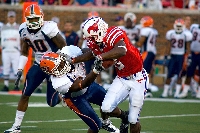Death penalty in college sports
By Catalogs Editorial Staff

What is the Death Penalty in college sports and how does it impact a school
The Death Penalty in college sports has earned that name because it is held up as being the ultimate punishment for teams who have committed multiple infractions. Unlike the actual Death Penalty, this particular punishment is considered so severe that the NCAA almost never hands it out.
In the history of college football only one team has actually been slapped with the punishment. In the whole of college sports, five teams earned the punishment. The SMU Mustangs earned their beat down after numerous investigations discovered that the program was not only continuing to commit infractions, but actively lying to the NCAA about their level of cooperation.
The last time the NCAA handed down the death penalty was in 1987. Leading up to the handing down of the ultimate sentence, the SMU Mustangs stood near the top of the college football world thanks to their “Pony Express” offensive attack. Some of the best athletes in football had come through the program, but they had done so thanks in large part because those athletes received payment. Paying athletes to attend one University over another is a huge violation of NCAA rules and the Mustangs had committed this particular infraction (and gotten caught for it) seven times since 1974. That particular number was the high water mark for any college football program over that time.
SMU certainly should have seen their final judgement coming. In 1985, the governing body of college sports voted to make it a rule that any program that committed more than one NCAA rules infraction in a five year period would face a 1 to 2 year death penalty.
For a ruling of this sort, an actual vote of the member schools had to be taken. Only six schools objected to this particular change in the rules and of course SMU was one. Losing 427-6 the Mustangs stood almost alone and it soon became evident why they were so opposed to the rule change.
~
SMU acted in ways that made it appear as if the school wanted to get the Death Penalty. The Mustangs had been paying players anywhere from $50 to $725 a month before they were caught in 2005. Despite the NCAA warning that another infraction would indeed mean the major punishment, the school continued paying players out of a slush fund. The school, oddly enough, felt they had to honor the commitments they had made to players vowing to stop the practice once every player who had been promised money left campus.
On November 12, 1986 former SMU linebacker David Stanley became the straw that broke the camel’s back. Stanley was kicked off of the team for steroid use and as revenge went to the media, informing them that the program was still paying players. Stanley’s report, along with the ensuing investigation ended with SMU being handed the Death Penalty on February 25, 1987.
The punishment meant that the SMU football team would have to cancel their 1987 season and would have to cancel all home games for the 1988 season. The NCAA threw a bone to the Mustangs by allowing them to play road games in 1988. This caveat allowed the school the chance to continue earning some revenue. The sentence included the ability for players on the team to transfer to another school without having to sit out a year (the usual rule regarding transferring teams).
Other schools raided the Mustangs’ roster and the school reported they didn’t have enough players to field a team for the 1988 season. In addition to two years of no games, the school had 55 scholarships over a four year period taken away. The school wasn’t allowed to appear on National television until 1989 further taking away possible revenue streams as well as hurting the team’s recruiting efforts. Staffing was affected by allowing the team to hire just five assistants as opposed to the usual nine.
In the end, the Death Penalty did what it was supposed to do. The punishment almost killed the Mustangs’ football program, giving them two decades of awful football. It was not until 2009 that the team actually posted a winning record and returned to a bowl game.
Popular Savings Offers





.jpg)





